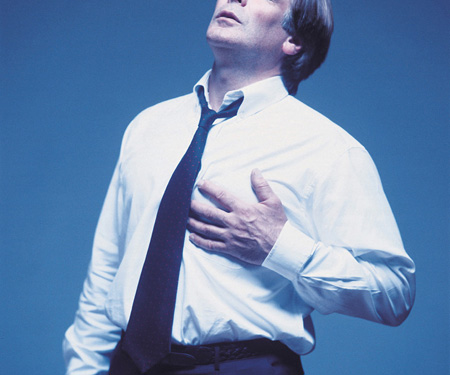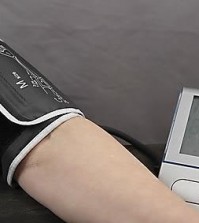- California Assembly OKs highest minimum wage in nation
- S. Korea unveils first graphic cigarette warnings
- US joins with South Korea, Japan in bid to deter North Korea
- LPGA golfer Chun In-gee finally back in action
- S. Korea won’t be top seed in final World Cup qualification round
- US men’s soccer misses 2nd straight Olympics
- US back on track in qualifying with 4-0 win over Guatemala
- High-intensity workout injuries spawn cottage industry
- CDC expands range of Zika mosquitoes into parts of Northeast
- Who knew? ‘The Walking Dead’ is helping families connect
Watch out for heart attacks on cold winter mornings

When a body is suddenly exposed to cold air, the risk of heart problems such as myocardial infarction increases. Doctors thus advise that special care
should be taken in the winter morning. (Korea Times file)
By Yoon Ja-young
As the temperature drops in winter, the risk of heart problems such as angina pectoris or even a myocardial infarction increases as does that of cerebral hemorrhages. The risk is especially high when one is suddenly exposed to the cold air in the morning after getting up from a warm bed. Doctors advise that special care should be taken to avoid cardio and cerebral incidents in the winter, which are two of the biggest causes of deaths for Koreans following cancer.
Prof. Kim Hyo-su at Seoul National University Hospital explained that both “the exposure to cold air” and “morning” are risk factors for heart problems and cerebral hemorrhages.
When a body is suddenly exposed to cold air, the sympathetic nerves activate to protect the body, contracting peripheral arteries and thus pushing up the blood pressure. If a thrombosis, or clot in the blood vessels blocks them, people may face a dangerous situation. The sympathetic nerves also increase the heartbeat rate, adding to the burden, Prof. Kim explained. “In the case of hypertension patients, the risk of a cerebral hemorrhage peaks if there is a steep rise in the blood pressure,” he added.
Regarding the risk involved in the morning, he explained “When a human body is asleep, the sympathetic nerves aren’t activated and the body and the mind are relaxed. When the person wakes up, however, the sympathetic nerves get activated and the body and the mind get tense. Hence, the burden on the heart is the greatest in the morning when one has just woke up. That’s why sudden cardiac death is common in the morning. Sudden exposure to cold air in the early winter morning, which involves both of the two risk factors, thus can trigger a myocardial infarction or cerebral hemorrhage,” he added.
Myocardial infarction or sudden cardiac death is mostly seen in people with ischemic heart disease, where the supply of blood to the heart is decreased, mostly due to arteriosclerosis. When a person with arteriosclerosis is suddenly exposed to the cold morning air, changes in the body triggered by the activation of sympathetic nerves, such as vessel contractions, increases in blood pressure and heartbeat, and the activation of platelet, could cause a myocardial infarction.
A cerebral hemorrhage, meanwhile, is common in people with hypertension. Prof. Kim, however, stressed that those who had no symptoms and considered themselves to be healthy can have atherosclerosis. Many people with hypertension also don’t know that their blood pressure isn’t normal. “Even if you have no symptoms, those who have high blood pressure, hyperlipidemia, or diabetes, senior citizens and smokers all have the possibility of having atherosclerosis. These people should avoid sudden exposure to cold air in the morning,” the doctor said.
The doctor warned that the risk of sudden cardiac death is especially huge if a person has drunk or smoked too much the previous day. “When one drinks too much, the risk of cardiac dysrhythmia increases the next morning…When you drink with smoking, the nicotine stimulates sympathetic nerves, weighing on the cardio vascular system and activating platelets. Carbon monoxide combines with hemoglobin, hampering the supply of oxygen to the heart and the brain.”
“Overdrinking and smoking the previous day and exposing oneself to cold morning air the next morning is like jumping onto the fire covered in petroleum,” he said.
Hence, when going out to get newspaper in the cold morning, for instance, he advised wearing enough clothes. He added that those who haven’t exercised in the morning had better wait until next spring instead of starting now. Those who have exercised in the morning can continue but they should dress themselves warmly, and exercise less compared to summer. He added that it is advisable to delay the exercise time a little, doing it after sunrise.
“When you feel stuffy or painful in the chest, or have problems breathing, immediately see a cardiologist,” the doctor stressed.
Regarding diet, sodium should be avoided as it raises the blood pressure, and so should animal fat as it can cause arteriosclerosis. One should regularly check blood pressure and blood sugar levels, and maintain a healthy lifestyle to keep these figures in a healthy range.









![일본 사도광산 [서경덕 교수 제공. 재판매 및 DB 금지]](http://www.koreatimesus.com/wp-content/uploads/2024/07/PYH2024072610800050400_P4-copy-120x134.jpg)


